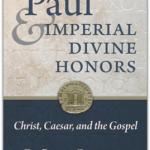As I announced previously, my newest article was published in Global Missiology. Someone read it and sent me a lot of good questions. I know from experience that others have similar questions. He said I could post our interaction. For the sake of his privacy, I’ll just call this person “John.” I hope you find it helpful. Let a comment with your own thoughts. This is PART ONE of two.
For those of you who have not read the article, I gave a brief overview in a previous post. You can link to the article and read it if you like. The article is titled, “We Compromise the Gospel When We Settle for Truth: How ‘Right’ Interpretations Lead to ‘Wrong’ Contextualization.”
Comment from John:
Honor-shame—I like your take on Romans here, particularly related to our dishonoring God as the root problem. I would like to see more developed on emphasizing both legal righteousness and honor/shame. I think that there has been a radical emphasis on one or the other. Reading through Romans 5, I see both. Even in China, I don’t think we can simply share the Gospel from one angle while neglecting the other. I love what you said here: “Rather than setting law and honor in tension, those engaged in contextualization and theological study do better to find how they are interrelated. More has been said on this topic elsewhere.”
JW:
My dissertation has a rather rigorous section of exegesis on Romans, esp. Rom 2–4. My last main chapter deals with soteriology, in which I address the atonement and justification. One of my main goals in the justification section is to show the relationship between righteousness-justification and honor-shame. Your dichotomy is standard, separating “legal righteousness” with honor-shame. I argue that this divide is a fundamental flaw of traditional theology. I’ll state things broadly here and let the dissertation demonstrate the exegesis and theology.
Law is a subset of honor-shame such that law is the socio-political expression of a people’s basic honor-shame standards. Righteousness is fundamentally an honor-shame concept, one sphere of which is the legal sphere. This claim does not contradict traditional theology but rather refines it with greater precision. Honor-shame is a holistic concept concerning collective identity, not simply pride and hurt feelings (as some people oversimplify it). So, yes, “righteousness” is a legal concept, but not only legal. It is fundamentally relational. Its “legal” context is actually a royal context. We should not overly reduce the meaning of “law” or “legal.” For example, legislation is a legal concept but that which is legal is not necessarily legislation. Western theology has treated “law” as if it were merely judicial, thus losing sight of the fact that a “royal” context is far more broad. In the contextualization packet (this refers to another document I wrote which John has), you will notice I listed a range of honor-shame passages in Romans. When I started noticing honor-shame features in Scripture, I met resistance from people. I decided to take on these objections squarely by diving in on traditional theologies “home turf”––Romans. If I “win” the argument with Romans, the whole debate is settled. In short, there is a legal dimension to justification but it is comparable to the “because she’s a woman” answer. The traditional view is true enough, but it’s not Paul’s main idea; rather, it’s an application of Paul’s main emphases.
Comment from John:
The knowledge/reality is helpful, especially for sharing the Gospel and teaching. One example is always the normal greetings, “Have you eaten yet?” My friend of three years, finally said, why do you ask me “What’s going on lately? (最近怎么样呢?)He said, “I don’t know how to answer you.” :-) The danger I see in China is the prosperity Gospel. They want to know what will benefit them or serve as practical. What are you suggestions on practical engagement here without compromising?
JW:
Regarding this question, I think the point is to show them why it matters that they be a Christian besides “going to heaven” in the next life (whatever someone means by that). Since we are to be disciples, not merely converts, this should not be as hard as it may sound at times. For example, if Jesus defeats death, then what should we fear? Nothing. Therefore, what would it look like to live a life without fear of other people? How would our loyalties be changed? When our theologies are so centered on “getting to heaven,” then we don’t make disciples, church life is not a priority, and obedience is optional. In addition, my point was to highlight the value of practical wisdom and the whole canon. Conservatives have made a canon within a canon. This does not honor God’s word. For example, I think Ecclesiastes would be a great place to dwell with Chinese people, especially for “seeker” studies. It’s meaty in terms of real life.
In the next post, John asks about my comments on absolute/relative truth, how to explain sin, and the implications of linear/cyclical history for theology.
















